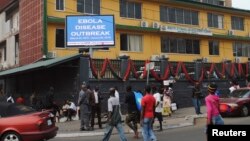The World Bank says the three countries most affected by Ebola will suffer a combined $1.6 billion in economic losses in 2015 due to the ongoing outbreak. Unemployment rates are also expected to remain high, with cross-border traders, private-sector wage earners and the self-employed among the worst hit.
The World Bank said that despite the recent slowdown in the number of new Ebola cases, the outbreak continued to “cripple” the economies of Guinea, Liberia and Sierra Leone.
More than half-a-billion dollars was lost due to forgone income in the three countries in 2014. It said that number was expected to more than triple in 2015.
The World Bank said that Sierra Leone would be the worst hit, with $920 million in losses this year, followed by $540 million in Guinea and $180 million for Liberia.
David Evans is a World Bank senior economist for the Africa region.
“The economic impact on these three countries has been nothing short of catastrophic really. Liberia’s growth forecast for 2015 has been cut in half and projected growth in Sierra Leone and Guinea for 2015 has shrunk to below zero. These are both countries that had healthy growth rates predicted for 2015 before the epidemic….So this is just a massive, massive negative economic impact,” he said.
Evans said that reductions in business activity, trade and planned foreign investment all contributed to these predicted lowered growth rates.
Emily Kolu sells beverages in Monrovia. She said her income was now less than half what it used to be.
“All day long we sit here…Ebola is making my customers afraid because they fear the situation they are in if they come out here…I used to sell sometimes over 20 or 25 crates of beer, but now I am suffering. Now it’s [down to] five or six,” she said.
John Kokolu, a local farmer, said he struggled to get his goods to market.
“It’s not difficult to grow food, but to take the food to the market is where we are facing problems, because, as I said, there are no public gatherings," he said.
Kokolu said closed borders have also made it impossible to sell his crops outside Liberia.
Exports have also been affected in Guinea. The World Bank, for example, said fish exports to neighboring countries have fallen by 40 percent.
Across the rest of sub-Saharan Africa, economic losses are expected to total around $550 million if the current spread of the disease remains limited.
The World Bank’s Evans said the key now was to finally stop the outbreak.
“The number one thing, ultimately, is getting to zero cases… Until we get to zero cases in these countries, people aren’t going to feel completely confident going about their business and moving around and doing what they need to do to provide for their livelihoods,” he said.
He said it was difficult to say exactly how long a full recovery will take, but that these economies could bounce back “relatively swiftly” once the outbreak was truly under control.




